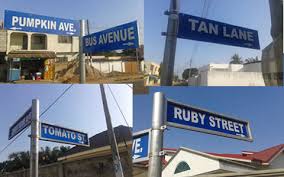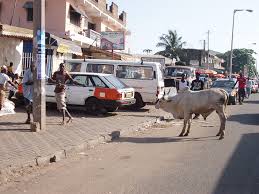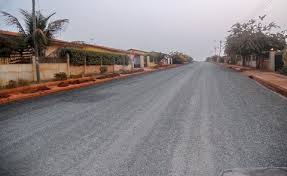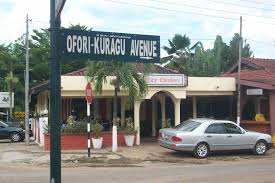Ghana’s mystifying house numbering System
Posted by By Akogun Akomolafe at 20 October, at 13 : 00 PM Print

Warning: count(): Parameter must be an array or an object that implements Countable in /home/alaye/public_html/wp-content/themes/Video/single_blog.php on line 56
Note: This was one of the first satires I wrote for the defunct HORIZON Magazine in the year 1996. Alas, almost twenty years later, nothing has been done to address the issue of street naming and house-numbering in the country. The opposition, New Patriotic Party, NPP, is making a major capital of the Electoral register.
With the many brains in the party, it mystifies greatly that no one can come to the simple conclusion that no credible register, electoral or whatever, is possible until we get a credible birth and death register which, in turn, requires a credible and proper Address Database System in the country?
I honestly don’t know why very simple, very obvious and very BASIC things becomes Major Production in Ghana Inc.
Any solution/suggestion, anyone?)
Anyway, here we go…
Which man in Ghana hasn’t experienced the frustration before? You see an oppressively beautiful damsel with plenty of good news in her body. You watched her industrial-sized vibrating rear engines with relish, your heart fell and you fall in love.
“Hi, princess,” you say in a weak voice. “What’s your name?”
She smiles shyly, “Florence.”
Most ladies in Ghana have abandoned their indigenous names for foreign, mostly Anglo-Saxon, names, all in the name of religion. Anyway, let us leave that one alone for now.
“Sunshine, where do you live?” You wanted to know more about this lady, whose sheer beauty is doing something to your psyches, and whose gorgeous eyes give you nasty thoughts. And those succulent lips, Allahu Akbar!
“Awoshie,” she replies, edging closer to you.
“Beautiful one,” you whine with undisguised lust, “which address, street and number, please?”
You’ll give anything to get this girl into…, where else? Use your imagination, my friend.
She takes her time scanning her memory bank and drew blank. Meanwhile, her beautiful Ghanaian face roams all over you, you felt weak with desire “I don’t know the number of the place,” she giggled, “come to think of it, I don’t even know the name of the street.” She giggles the more.
She’s finding her confidence and her voice is becoming more stable.
You didn’t find the situation so hilarious.
“Princess,” you cry with passion, “why are you doing this to me? You don’t know or you don’t want to tell me?”
Her face turns into a register of profound concern, “Oh, no, not that! I am not doing anything to you. It is just that they keep changing what they write on the house. The last time they came, I think that they wrote something like M or H or something and they added some figures like 538/17/D or 385/07/M or 835/71/P, I really don’t know.”
She is really interested in you, you could tell. She then goes on to describe her domicile like this: “You stop at the Awoshie trotro stop, the last bus stop. On the right side you’ll see a woman selling Kenkey in a chop bar; I think it’s called the Bachelor’s Korner or something like that. At the back of the chop bar is a small road. You take that small road and walk for about fifty meters until you reach a T-junction. On the left side is a small mosque, you continue for about twenty meters, you’ll see a Pentecostal church, a very small one. They are just starting there, but you will hear their loud music. You turn to the right, twenty meters down that road, you’ll see another chop bar, it is right beside an akpeteshi bar. I think it is called Hide Out Spot or something. At the back you’ll see a small white house, you go right in the middle of the house; don’t worry, they will allow you to go through. You’ll emerge on a small foot-path. Ten meters thence, you turn to the right, walk until you get to a tall Neem tree and then turn to the left. Count five houses on the left side, my house is the sixth one. The one with a brown gate”
Your mind is in turmoil. Inasmuch as you desire this beauty, your mental faculties are incapable of coping with the geographic hocus-pocus she calls address.
Unless you’re wagoned (‘have a ride’ in Ghanaian parlance), you’ll have to curse your bad-luck.
Bye-bye princess.
Why are streets not named in Accra, and why are named-streets numbered with a system that looks as though it was designed by a crazy mathematician or a guy who thinks that Calculus is fun or someone who eats Kenkey and Shito every morning?
In most cities that I know, houses are numbered consecutively. That is: 1, 2, 3, 4 and so on.
It is not so in Accra where a special alphanumeric code is in use. House number one could be mysteriously numbered N 123/X, the next one enigmatically numbered B789/V and the third equally cryptically encoded.
To find answer to the puzzle, I went to the GPO headquarters in Accra and spoke with the Deputy- Director in charge of PR.
He was an elderly, round-faced man with a round and paunchy stomach (Managerial Gut in local parlance).
He looked so old that I was tempted to ask what the retirement age is in Ghana. I was ushered into his bare, austere office by a voluptuous secretary with the intimidating look of a Makola madam.
The very large office sported no modern amenity sans the fluorescent light. A thousand-year old looking typewriter is the most technologically advanced appliance in the room.
Mr. Patrick Aidoo welcomed me like a lost son, “Welcome, you’re very welcome, eh, eh. Kindly take a seat.”
He threw some ancient files down from a chair, wiped it clean with his palm and dragged the decrepit thing to me.
“Sit down. You’re very welcome, eh, eh.” He almost suffocated me with his effusiveness.”
“Thank you. Thank you very much.” I said and tested the strength of the chair before sitting in it.
“Don’t mention,” aged voice assured me.
“You’re welcome, eh, eh. What’s it that we can do for you? Welcome, eh, eh.” He took his seat, re-adjusted the glasses perched rakishly on his nose.
“Thank you. I am doing a research on the Ghana postal system with a bias towards the street- naming and house-numbering system.”
“Oh, I see! Research on postal service, street-naming, house-numbering system. Research, eh, eh. I see.”
I don’t know what he saw. And why can’t he stop all the ermings and ehings?
“Actually sir, I think that if by system we meant some resemblance of logic and order, I think that in the context of the Ghana postal service, system is the wrong word to use. I think that we should be talking about a lack of a system.”
“Young man, are you ridiculing our system?” Mr. Aidoo’s voice trembled with suppressed ancient emotions.
“Far from it, sir. I was just thinking that system is the wrong word to use in a situation whereby streets are not named and the ones names are numbered by system that looks as though it was designed for a secret society?”
Mr. Aidoo scratched his baldness. “Are you among those whose stock in trade is to poke fun at establishment? No system designed by a man is perfect and ours is no exception. We are busy revising it all the time and that’s what we’re doing. I really don’t see your problem, young man.” He looked at me as though I was an errant son.
“I am sorry that you felt that way, sir. I am just trying to understand what logic informed the present system. I consider myself of average intelligence, yet I can’t make a head or tail out of the present system. No one that I’ve spoken to understands it, either. Since your system was designed to satisfy the customer, how could we take advantage of a system that remains a mystery to us?”
“Young man, look here,” ancient voice reverberated around the room, “you’ve lived abroad for so long that you think that everything should be done in Ghana the way it is done outside (he stretches the word). No country has solved all its problems; we’re doing our best here.”
“Once again, I’m sorry that you felt that way. I am not talking about countries solving all their problems. I’m just wondering why a really simple street-naming and house-numbering system should become a major production in Ghana.”
“What specifically are we talking about, young man?” The old man wanted to know, his Adam- apple dance up and down like some primitive creature.
“I am talking specifically about counting, sir. We’re taught to count consecutively, i.e. 1,2,3,4,to 10 to 100 to 1000 and so on. That seems to us like the natural order of things – every child understands it. I’d like to know why Ghana Post decided to change this simple system which everyone understands to one which even nuclear physicists have problem understanding. Or is your organization operating under some reverse Eisteinean principle that everything should be made as complicated as possible.
“Look, young man,” ancient voice cracked with passion. “We’ve been operating our system since the British were here, you see. It has stood us in good stead. A lot of energies have been invested in bringing it to its present level. Now you’re telling me that you cannot see the logic behind it. Where have you been looking?” Mr. Aidoo’s face was a map of paternal concern as he regarded me.
I was unmoved.
“Perhaps, sir, you can simply explain to me the logic behind the system. Because a system has been in place since colonial times is no argument for its retention. Actually, since I know that the British Royal Mail is continually changing its own system; it is the main reason why it should be changed – made up-to-date. Human society is a dynamic one, sir. Institutions and organizations should not be allowed to freeze themselves into a sort of time warp. Perhaps your system makes perfect sense to you and other lucky initiates, but to your consumers, of who I am but one, it is full of shit-holes that must be plugged. We are on the same side, sir. I am no management expert, but I do have a suggestion or two on how you can improve your services and contribute your quota in improving the economy of this country and, in the process, alleviate some of the groaning unemployment problems.
A bemused smile danced on Mr. Aidoo’s antediluvian face, “Glad to hear that we’re on the same side,” he retorted sarcastically. “And what are these suggestions of yours which have eluded the best brains we have in our organization?
I was undisturbed. Staring fixedly at the aged face, I said, “We have to make some basic, even elementary assumptions about your organization. One is that it was set up to improve the communication system in Ghana, bring people closer to one another, so to speak. It is also to make some money in the process and contribute to the economy. Another of our assumptions is that your organizations have to keep abreast of new techniques and technologies in order to improve its services. Are you meeting either of these? You’ll agree, without even a scientific poll, that only a tiny percentage of the population is using your services at present. We then have to analyse the reason for this sorry state of affair. I hope that you’re following me?”
Mr. Aidoo toy with his spectacles as he regarded me coolly, “A lot of analyses. What are actually the suggestions?” He said in an impatient voice.
“It is simple, sir. A street-naming committee should be set up as a matter of national emergency. Every street in the country should be named. Following that we should jettison the archaic house- numbering system. While not all of us are endowed with great mathematical abilities, most of us can count one, two, and three. A well-designed system, a great mind once said, is simplicity at its best. Every street should be named, every house numbered. The benefits will be many and immediate. People don’t write letters at the moment because no one can remember the street name and number where his\her relative lives. A simple, understandable system will result in people writing more letters. The current system is responsible for the high cost of postage stamps. The prices are bound to fall as more people write. This is simple economics. Your customers, who can now write to their relatives, will be happy. You’ll be happy because you will be laughing all the way to your bank. Your suppliers will be happy, so will their suppliers, too. The positive effects will boomerang down the road.”
The elderly man was laughing uproariously,” So street-naming and house numbering will increase postage stamps sales, is that all? Actually, our sales are up, so is our profit.”
“That’s not all, sir. The suggestion also has some positive social effects. Chances are that if I ask you where you live, you’ll be describing it to me, instead of telling me the street name and the house number. I have hardly scratched the surface of the social and economic benefits accruing from a better-managed system. A lot of our youth are unemployed. They are wasting away their lives drinking and smoking away their sorrows. They are able-bodied, ready-to-work young men. If more people are writing, we will, naturally, need more hands to carry and sort the letters. Perhaps we can then join the rest of humanity in distributing letters to homes on a daily basis. As we have it now, people are journeying (at great cost to both their lives and their economies) to deliver simple messages which could easily be written and posted. As we have it, a lot of things are not being done in the country today because the statistics didn’t exist. And the statistics did not exist simply because there is no reliable database of houses. Commerce is being crippled because people cannot give easily verifiable addresses; banks do not extend loans for the same reasons. Government is losing enormous amount of revenue simply because it does not have the correct database. The police waste massive amount of manpower in dragging people to stations rather than issue them with on-the-spot tickets. Service (water, electricity, telecommunication) providers are not extending services because of lack of good address system. I can go on and on and on.”
Mr. Aidoo was not convinced, “And you think that more postal boxes couldn’t solve the problems you just diagnosed?” He sneered.
“Space alone would not permit it. How do you erect postal boxes for twenty or so million Ghanaians?” I snapped back; irritated by the old man’s obduracy.
“I must thank you for all your concern. I wondered why all these have escaped us all these years.” He said with biting sarcasm.
“It escaped you simply because bureaucrats are not the world’s greatest thinkers. You and I know that human beings are, by nature, averse to anything that challenges their comfortable, even if indolent, positions. Our problems will be half-solved when our bureaucrats begin to think.”
About the Author
Femi Akomolafe is a passionate Pan-Africanist. A columnist for the Accra-based Daily Dispatch newspaper and Correspondent for the New African magazine. Femi lives in both Europe and Africa, and writes regularly on Africa-related issues for various newspapers and magazines.
Femi was the producer of the FOCUS ON AFRICANS TV Interview programme for the MultiTV Station.
He is also the CEO of Alaye Dot Biz Limited Dot Biz, a Kasoa-based Multimedia organisation that specialises in Audio and Video Production. He loves to shoot and edit video documentaries.
His highly-acclaimed books (“Africa: Destroyed by the gods,” “Africa: It shall be well,” “18 African Fables & Moonlight Stories” and “Ghana: Basic Facts + More”) are now available for sales at the following bookshops/offices:
- Freedom Bookshop, near Apollo Theatre, Accra.
- The Daily Dispatch Office, Labone – Accra
- WEB Dubois Pan-African Centre, Accra
- Ghana Writers Association office, PAWA House, Roman Ridge, Accra.
- African Kitchen in Amsterdam Bijlmer
Where to buy them online:
On Lulu Books:
18 African Fables & Moonlight Stories https://goo.gl/Skohtn
Ghana: Basic Facts + More: https://goo.gl/73ni99
Africa: Destroyed by the gods: https://goo.gl/HHmFfr
Africa: It shall be well: https://goo.gl/KIMcIm
Africa: it shall be well
on Kindle books: https://www.createspace.com/4820404
on Amazon books: http://goo.gl/QeFxbl
on Lulu Books: https://goo.gl/SQeoKD
Africa: Destroyed by the gods
on Kindle books: https://www.createspace.com/4811974
on Amazon books: http://goo.gl/1z97ND
on Lulu Books: http://goo.gl/KIMcIm
My Lulu Books page: http://www.lulu.com/spotlight/FemiAkomolafe
Get free promotional materials here:
- Africa: it shall be well: http://alaye.biz/africa-it-shall-be-well-introduction-in-pdf/
A FREE Chapter of ‘Africa: It shall be well’ could be downloaded here: http://alaye.biz/africa-it-shall-be-well-a-free-chapter/
- Africa: Destroyed by the gods (How religiosity destroyed Africa) http://alaye.biz/africa-destroyed-by-the-gods-introduction/
A FREE Chapter of ‘Africa: Destroyed by the gods’ could be downloaded here: http://alaye.biz/africa-destroyed-by-the-gods-free-chapter/
Contact Femi:
Femi’s Blog: www.alaye.biz/category/blog
Website: www.alaye.biz
Femi on Amazon https://www.amazon.com/author/femiakomolafe
Twitter: www.twitter.com/ekitiparapo
Facebook:https://www.facebook.com/alayeclearsound;
Gmail+: https://plus.google.com/112798710915807967908;
LinkedIn: www.linkedin.com/in/femiakomolafe
Email: fakomolafe@gmail.com
Kindly help me share the books’ links with your friends and, grin, please purchase your copies.
Comradely,
Femi Akomolafe
Alayedotbiz, Blog, Book Review, Interviews, News, Polemics, Random Musings, Satire










